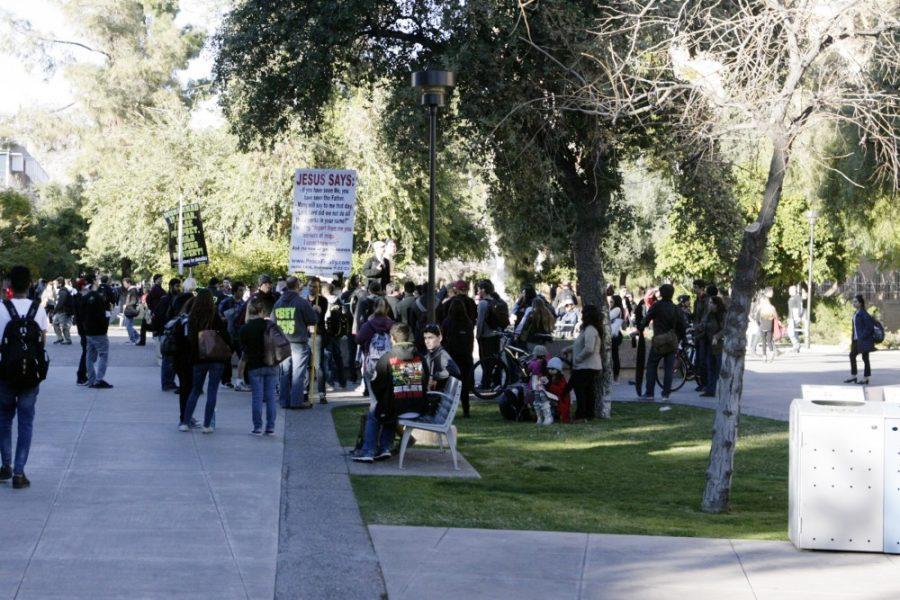The Dean of Students Office and the University of Arizona Police Department remain firm in protecting free speech on campus after two incidents involving student altercations with campus preachers on April 11.
Kiersten Rodriguez, a freshman studying political science and French, knocked over the sign of a pro-life preacher while walking by the Student Union Memorial Center where the preacher was speaking, according to a report by UAPD.
“They had a poster with graphic images,” Rodriguez said. “So, I tipped over the poster.”
She walked away while the preacher followed her and yelled at her to stop walking. The man continued to follow Rodriguez, telling her to stop for around 20 to 30 minutes and the man eventually grabbed her arm, according to Rodriguez.
In another incident, a man reported to UAPD that his friend, a pro-life preacher speaking on campus, was out chasing a man who had taken one of the pro-life preacher’s signs. The sign was worth $16 and had the words “repent believe in the gospel” on it, according to a police report for the incident.
While the extent of these incidents may be uncommon, the heated interactions between speakers on campus and students happen occasionally.
The Dean of Students Office is sometimes called out when people are concerned about the nature of the speech, and they will send out a staff member to interact with the speaker if there are speech-related issues, according to Kathy Adams Riester, associate dean of students.
As far as the speech-related issues go, Riester and the Dean of Students Office can’t regulate the content or viewpoint of the speech, but just the time, place and manner. This means they can regulate when amplified sound is allowed, and public outdoor spaces are fair game as designated public forums.
“As long as [the speaker’s] behavior and what they’re doing is not disruptive to other people who are out there and as long as they’re not blocking access and entrances—that kind of thing—that’s about all we regulate with that,” Riester said.
In the case of incidents like those on April 11, Riester said the disruption falls on the person who is trying to stop the speech by taking the speaker’s items, because the speaker has the right to express their view.
When people do interfere with free speech, depending on their level of interference, they can be arrested. Sgt. Filbert Barrera, UAPD public information officer, said he arrested someone for assaulting a preacher on the mall a few years ago.
“I think from time to time we do get some people who come to campus who are looking to kind of stir the pot,” he said. “So from time to time we do get calls of maybe people out there were maybe getting pretty heated and people just kind of want us to be there, but we come from the standpoint when we respond that we’re there to just protect people’s rights for the most part and we want to make sure that everyone has an ability to express their viewpoint.”
Riester said she knows students sometimes get frustrated with the speech on campus, but she encourages them to “counter speech with speech” or to ignore the speakers.
For Barrera, he understands that some of the speakers on campus “have a disgusting viewpoint,” but they still have the right to free speech under the First Amendment.
“We are just like everyone else,” he said. “We agree that for the most part, when these Mall preachers go in there and they start saying things that are degrading to women and degrading basically to everybody, we still have to protect their right to say these things.”
Barrera echoed Riester’s sentiment that students who do not agree with speakers can ignore them or engage in speech as well, but he also said that engaging with speakers is “what they want.”
“The easiest way for you to make sure that they go away quickly is just to ignore their message,” he said.
When it comes to ignoring the speakers or trying to counter their speech, Rodriguez sees a problem.
“They are always out when I have classes, which is the worst. I see all of the screaming and the fighting between them,” she said. “There’s only so much you can do to counter what [the speakers are] saying before people are going to get pissed off and there’s going to be one that does something and it’s going to go too far.”
Rodriguez said the university should come up with a better response to the speakers, citing a petition that circled around calling for the removal of campus preachers.
Riester, however, has a different view on the freedom of speech on the university campus, citing the transition from a more regulated high school environment to college as a component in students learning how to address viewpoints different than their own.
“They see things that might hurt them or hurt their values and they haven’t really learned the skills on how to address that by countering speech or countering with different thoughts and different ideas,” Riester said. “So, I think that that’s one of the things that, you know is hopefully a skill that we help them learn how to grow and improve while they’re here at the university and realize the importance of that ability to have discourse on different ideas and different thoughts.”
Follow Ava Garcia on Twitter









